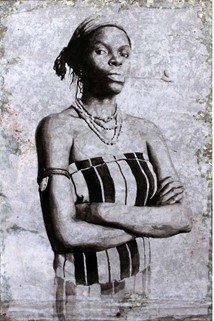Aline Sitoé Diatta: women’s anti-colonial resistance in Senegal
For this BHM series, I chose to write about Aline Sitoé Diatta (c1920 – 1944), a Senegalese anti-colonial resistance figure and community leader in the Casamance region. She was one of a number of women who led anti-colonial campaigns in what was then called French West Africa during the period of the Second World War. Born in the southern region of Casamance, she is said to have had a ‘vision’ in 1941, which called upon her to struggle against the French colonial forces (Baum, 2015). When the French seized half of the region’s rice harvest to support the war effort, Aline Sitoé Diatta began her campaign alongside other market women. She encouraged the population to refuse cooperation with the French, to stop paying taxes, and to reject calls to replace rice cultivation with the growing monoculture of arachide (peanuts). Aline Sitoé Diatta also called for reinstatement of better working conditions and rights to religious worship. She was perceived as having supernatural powers, in particular the ability to bring rain to the parched land. The French forces made several attempts on her life, and she was arrested on 8 May 1943. She died a year later, in prison in Timbuktu, Mali.
Aline Sitoé Diatta remains a national heroine figure in Senegal. Since the 1980s, her story has been recuperated in different ways and for different purposes, in connection with the separatist movement in the Casamance region (Toliver-Diallo). The main ferry from Casamance to the capital Dakar is named after her, as well as the women’s university halls of residence at the Université Cheikh Anta Diop (the country’s largest university, which has an exchange agreement with the University of Bristol). As I’m exploring in my current research, the female residents of the university halls named after her are sometimes treated with suspicion, accused of immodesty or prostitution. This aspect of her memorialisation points to transhistorical gendered injustices, encouraging us to reflect on how African female icons from the past connect to feminist activism today. For further reading, see this recent series of interviews and blogposts about contemporary African feminisms, coordinated by Dr Rama Salla Dieng: https://africasacountry.com/2020/05/talking-back-african-feminisms-in-dialogue.
References:
Baum, Robert M. West Africa's Women of God : Alinesitoué and the Diola Prophetic Tradition, Indiana University Press, 2015.
Toliver-Diallo, Wilmetta J. “‘The Woman Who Was More than a Man’: Making Aline Sitoe Diatta into a National Heroine in Senegal.” Canadian Journal of African Studies / Revue Canadienne Des Études Africaines, vol. 39, no. 2, 2005, pp. 338–360.
by Ruth Bush

